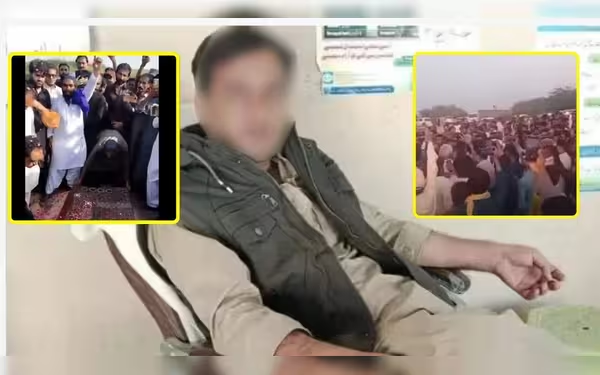Thursday, November 7, 2024 01:41 PM
Sindh Protests Against Extremism at Dr. Shah Nawaz's Funeral
- Public outrage against blasphemy-related violence.
- Thousands gathered to honor Dr. Shah Nawaz.
- Calls for an end to religious extremism.
 Image Credits: thecurrentpk
Image Credits: thecurrentpkSindh protests against extremism at Dr. Shah Nawaz's funeral, highlighting public outrage over blasphemy-related violence.
In recent times, Pakistan has witnessed a troubling rise in extremism, particularly surrounding the sensitive issue of blasphemy. This situation escalated dramatically with the tragic death of Dr. Shah Nawaz, a medical professional who was killed in an alleged extrajudicial encounter by the Sindhri police in Mirpurkhas. Dr. Nawaz was suspected of blasphemy, a charge that has led to numerous violent incidents across the country. His funeral on September 22 became a focal point for public outrage against the growing tide of religious extremism.
Thousands gathered in Dr. Nawaz's native village near Umarkot to pay their respects, and the atmosphere was charged with emotion. Attendees from various backgrounds, including those who traveled from Karachi and other parts of Sindh, expressed their anger through powerful slogans. The crowd chanted, “Mullah gardi band karo, dehshagardi band karo,” which translates to “stop this extremism by religious leaders, stop this terrorism.” This collective voice highlighted the frustration of many citizens who feel that the misuse of the blasphemy law has led to unjust violence and fear.
Reports indicate that a mob, allegedly linked to the far-right group Tehreek-i-Labaik Pakistan, had previously burned the body of Dr. Nawaz, showcasing the extreme reactions that blasphemy accusations can provoke. The funeral attendees, however, sought to reclaim the narrative, emphasizing that such acts of violence are not representative of the true spirit of Islam or the values of Pakistani society.
As the crowd gathered around Dr. Nawaz’s grave, adorned with the traditional Sindhi shawl, Ajrak, they sang folk songs, creating a poignant moment of unity and remembrance. This act of solidarity served as a reminder that many Pakistanis are tired of the cycle of violence and are calling for a more peaceful and tolerant society.
The events surrounding Dr. Shah Nawaz’s funeral reflect a critical juncture in Pakistan’s ongoing struggle against extremism. It is essential for the government and society at large to address the root causes of such violence and to foster an environment where dialogue and understanding can flourish. The voices raised at the funeral are a testament to the desire for change, and it is crucial that they are heard. Only through collective action and a commitment to justice can Pakistan hope to move forward and ensure that tragedies like this do not occur again.













